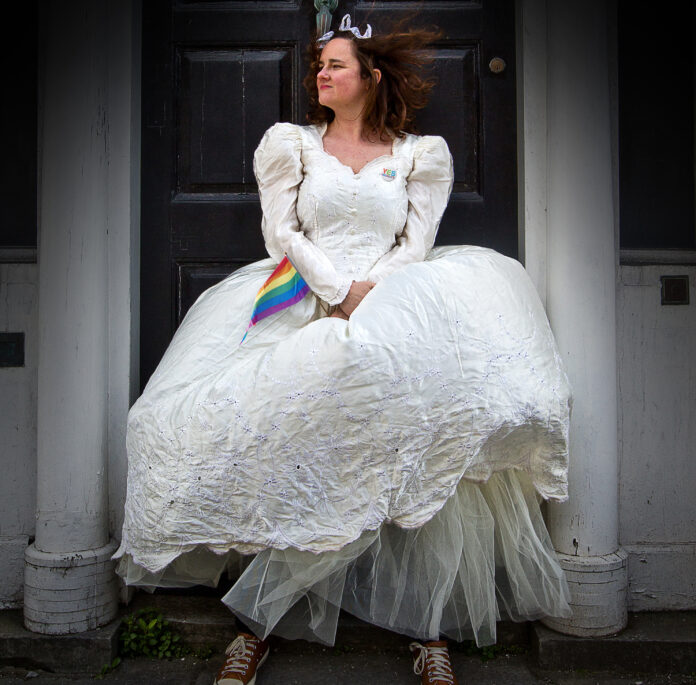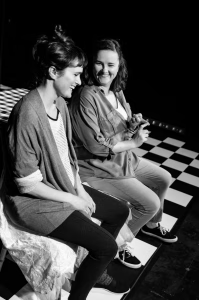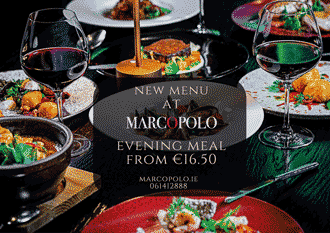
On the morning of 24 May 2015, a groggy nation awoke to a new Ireland—one where love had won at the ballot box. “How’s the morning after the life before?” came a text to Limerick theatre maker Ann Blake from her brother, following the landslide result of the Marriage Equality referendum.
Ten years on, Blake’s celebrated play The Morning After The Life Before will mark the anniversary with a special one-night performance in the atmospheric surroundings of Dance Limerick on Saturday May 24 at 8pm. Tickets are available from GOSHH at (061)314354 or from www.eventbrite.ie

Presented by Gúna Nua Theatre Company in association with GOSHH, this multi award-winning production, written by and starring Ann Blake alongside Lucia Smyth, has toured across Ireland and internationally, touching audiences in London, Brighton, Liverpool, Montreal and New York. Directed by acclaimed theatre director Paul Meade, the production now returns home to the city where it first premiered in 2017 at Belltable.
Blake, co-creator and performer, chatted with Limerick Post and reflected on the legacy of the referendum, acknowledging both the euphoria of victory and the fear that preceded it.
Does it still feel like the big change it did the morning after? How does it feel 10 years on?
“You know, the strange thing is that now, it’s a moment in history.
“The play captures this incredible moment in time and the campaign that led to it—a campaign rooted in love and kindness, not hate or division. So many people stood with us then, and now it’s our turn to stand with others who are under the spotlight—who are being targeted and diminished.
“I had this beautiful moment in Montreal where an Irish person came up to me after a performance and said, “Thank you for capturing that day. I was proud to be Irish.” That’s what the play is about—remembering what we did, and what we can do as a country.
At the time, we were seen as a beacon. Countries like Germany and Australia were saying, “Hang on—we don’t have marriage equality yet?”
What was the night of the result like for you?
“We went absolutely bananas!
“It was joyful, it was emotional, it was amazing. The whole queer community, everyone who had supported the campaign—everyone was just euphoric.”
The polls suggested the referendum would pass comfortably. Did it feel that way within the campaigners?
“Not at all. There was genuine fear that it wouldn’t go through.
“When I was developing the play with my director, we discussed that tension. He said what you’ve just said—“But it was always going to pass, wasn’t it?” And I thought, well, that’s a lovely confidence from liberal allies.
“But when it’s your own rights, your own life on the line, you can’t be complacent. There was a lot of fear, especially during the campaign.
“There were times when canvassers were having terrible experiences on the doors, and we genuinely felt the referendum might fail. And I think it’s important that people understand that. I know quite a few people who changed their minds because of conversations they had during the campaign.
I remember a friend telling me her boyfriend wasn’t planning to vote—he just didn’t usually bother. And I asked her, “Would you beg him to, for me?”
“He assumed it would pass. I said, “I know people who are going to vote no. Could you ask him to show up for me?”
“We even questioned whether we’d stay in Ireland if it didn’t pass.
“It wasn’t about fearing physical violence when walking down the street—it was about how safe and accepted we’d feel in our own country.
“It’s the small things: how someone reacts when you say, “This is my wife.” That tiny moment can either feel ordinary or like rejection. The mental toll of anticipating that reaction all the time is exhausting.
“We don’t want anything extraordinary—just the right to get on with our lives, our happy, boring lives.” laughs
Would the campaign be more difficult to run in 2025—post-Covid, in a “post-truth” era, with increased toxic shite spreading online and the erosion of rights in the US?
“Yeah, I do. What’s comforting is – we’ve done this. The most important thing about a campaign is speaking to people and talking and getting offline. “The most powerful thing still to this day is knocking on doors.
“We need to remember who we are. We’re a country that welcomes, that shows kindness. This “Ireland first” rhetoric isn’t just anti-immigrant—it’s also homophobic, anti-diversity, and it doesn’t reflect the real Ireland.
“We’re not perfect, but we’re a nation that talks to each other. We’re more village-minded than other, bigger sprawling societies. A quick conversation can cut through so much fear and misinformation.
“That’s why voting is so important. You can change a country. You can make someone’s life safer—or harder—depending on whether or not you show up.
“That’s a big reason why I want to do this show—to remind people that their vote matters, that showing up matters, especially for others.”
The Morning After The Life Before plays at Dance Limerick this Saturday May 24.







